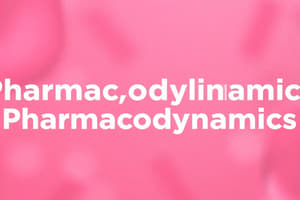Podcast
Questions and Answers
What does pharmacodynamics study?
What does pharmacodynamics study?
- How the body processes drugs
- The biological and therapeutic effects of drugs (correct)
- The preparation and dispensing of medications
- The physiological effects of exercise on the body
Which branch of pharmacology focuses on the undesirable effects of drugs?
Which branch of pharmacology focuses on the undesirable effects of drugs?
- Clinical pharmacology
- Toxicology (correct)
- Pharmacotherapeutics
- Pharmacodynamics
What is the definition of pharmacokinetics?
What is the definition of pharmacokinetics?
- The study of how drugs modify physiological systems
- The study of drug side effects in patients
- The selection and use of drugs for treatment
- The study of drug absorption, distribution, metabolism, and excretion (correct)
What is the primary responsibility of the Food & Drug Administration (FDA)?
What is the primary responsibility of the Food & Drug Administration (FDA)?
What term describes an unintended action of a drug?
What term describes an unintended action of a drug?
Which of the following best defines pharmacotherapeutics?
Which of the following best defines pharmacotherapeutics?
What does the term biotransformation refer to in pharmacology?
What does the term biotransformation refer to in pharmacology?
Which statement about drug effects is accurate?
Which statement about drug effects is accurate?
What does the term 'generic name' refer to in pharmacology?
What does the term 'generic name' refer to in pharmacology?
Which of the following is NOT one of the 'Five Rights' of Medication Administration?
Which of the following is NOT one of the 'Five Rights' of Medication Administration?
Controlled substances are defined as substances with:
Controlled substances are defined as substances with:
What is indicated by the term 'pharmacologic class'?
What is indicated by the term 'pharmacologic class'?
In prescription writing, which part is typically placed at the beginning of a prescription format?
In prescription writing, which part is typically placed at the beginning of a prescription format?
For which route is 'IV' used in medical prescriptions?
For which route is 'IV' used in medical prescriptions?
What is the best practice regarding the use of drug names to avoid confusion?
What is the best practice regarding the use of drug names to avoid confusion?
Which is an example of a therapeutic class of drugs?
Which is an example of a therapeutic class of drugs?
Flashcards are hidden until you start studying
Study Notes
Learning Objectives
- Define key pharmacological terminologies.
- Understand pharmacodynamics (effects of drugs on the body) and pharmacokinetics (how the body processes drugs).
- Comprehend theoretical pharmacokinetics concepts: half-life, order of kinetics, steady state, and plasma concentration.
- Recognize drug safety and effectiveness, including factors affecting drug action and possible adverse drug reactions.
Definitions
- Pharmacology: Study of drugs, their effects on living systems, history, sources, physicochemical properties, dosage forms, administration methods, and adverse effects.
- Drug: A substance that modifies physiological systems or pathological states for therapeutic benefit or diagnosis.
- Pharmacokinetics (PK): Focus on absorption, distribution, metabolism, and excretion (ADME) of drugs; describes what the body does to drugs.
- Pharmacodynamics (PD): Examines the biological and therapeutic effects of drugs; explains what drugs do to the body.
- Pharmacotherapeutics: Involves the selection and proper use of drugs for prevention and treatment of diseases.
- Toxicology: Part of pharmacology that studies the undesirable effects of drugs on biological processes.
- Clinical Pharmacology: Systematic study of drugs in humans, assessing pharmacokinetics and pharmacodynamics, safety, efficacy, and side effects.
- Pharmacy: Branch of science related to preparing, preserving, compounding, and using drugs.
Regulatory Agencies
- Food & Drug Administration (FDA): Federal agency responsible for ensuring drug safety and efficacy in the U.S., along with food and cosmetics oversight.
Adverse Effects
- Adverse or Side-Effect: Unintended actions of a drug; can occur due to lack of specificity in drug action; all drugs may produce adverse effects.
Drug Names
- Chemical Name: Describes a drug's chemical composition and molecular structure.
- Generic Name: Nonproprietary name approved for the drug, provided by the United States Adopted Name Council.
- Trade Name/Brand Name: Proprietary name with registered trademark, restricted by the manufacturer.
Drug Classification
- Pharmacologic Class: Drugs sharing similar characteristics (e.g., beta-adrenergic blockers).
- Therapeutic Class: Groups drugs based on therapeutic use (e.g., antihypertensives).
Prescription Writing Principles
- Prescription: Written, verbal, or electronic order for medication for a specific patient.
- Five Rights of Medication Administration:
- Right drug
- Right dose
- Right time
- Right route
- Right patient
Prescription Formatting
- Parts of Prescription:
- Heading
- Body
- Closing
- Common Abbreviations:
- Tablets - tab, Capsules - cap, Syrup - syr, Injection - Inj, etc.
Routes of Administration
- PO: by mouth, PR: per rectum, IM: intramuscular, IV: intravenous, ID: intradermal, IN: intranasal, TP: topical, SL: sublingual, BUCC: buccal, IP: intraperitoneal.
Controlled Substances
- Defined as prescription drugs with tightly controlled use and distribution due to abuse potential or associated risks; regulation is more stringent.
Studying That Suits You
Use AI to generate personalized quizzes and flashcards to suit your learning preferences.



